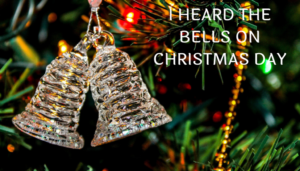WHEN CALVARY COMES TO CHRISTMAS
Articles By Tom Alexander December 23rd, 2021
The Bells Are Ringing And The Choirs Are Singing. “Peace On Earth Good Will Towards Men” But There Is No Peace.
On Friday, December 25, 1863 the world acclaimed literary critic and celebrated poet Henry Wadsworth Longfellow wrote a poignant poem seeking to capture the dynamics and dissonance in his own heart and the world he observed around him that Christmas day. The poem, “Christmas Bells,” would soon be turned into a song of hope, of faith and of trust and retitled “I Heard The Bells On Christmas Day.”
Two years earlier, Longfellow heard the frantic screams of his wife as she ran into his study, and who was engulfed in flames. Her dress had somehow caught on fire. In desperation, Longfellow grabbed a heavy rug and tried to extinguish the fire, but to no avail. His wife died the next morning. He himself was severely burned and couldn’t attend his wife’s funeral.
THE CHRISTMAS CRISIS
One December 1, 1863 America was in the middle of a war against itself when Longfellow received a telegraph with the news that his son had been severely wounded by a Confederate bullet. Taking a train to Washington D.C. to help tend his son’s wounds, the highly acclaimed poet was in despair as Christmas Day approached.
As he wrote the impactful poem that Christmas morning in 1863, Longfellow at first could only express in his mind and from his pen words of injustice and violence from the world he lived in that seemed to mock the jubilant sound of Christmas bells and the chants of peace on Earth coming from the voices of church choirs:
And in despair I bowed my head;
There is no peace on earth I said.
For hate is strong and mocks the song
Of peace on earth, good will toward men.
But, as it so often happens in moments of deep darkness and utter despair, the right words came to the poet’s mind and flowed triumphantly from his pen in contradiction to the hopelessness, sadness and despair:
Then rang the bells more loud and deep,
God is not dead nor does He sleep.
The wrong shall fail, the right prevail
With peace on earth, good will toward men.
BUT WHAT ABOUT ATOM BOMBS?

The Two Atomic Bomb Blasts Over Hiroshima and Nagasaki August 6 and 9, 1945 That Brought An End To World War II.
Two years before I was born, and in 1945, the head of the team of physicists that supervised the creation of the first atom bomb appeared before a congressional committee and was asked by the chairman if there was any type of defense against the weapon of mass destruction.
“Certainly,” the esteemed physicist replied. “And that is?” an impatient and condescending congressman asked. The nuclear scientist looked across the hushed and expectant audience and softly answered, “Peace.”
PEACE. According to historians, only 8 percent of the time since the beginning of recorded history has the world been entirely at peace. America’s Civil War at the time of Longfellow’s poem and the on again, off again conflicts in the Middle East and Western Europe have taught us that wars can be won, but winning the peace is extremely difficult, if not impossible.
HE HIMSELF SHALL BE OUR PEACE!

Jesus The Messiah Is The One Who Gives Lasting peace To All Who Are Experiencing Holiday Hurt, Seasonal Sadness Or Christmas Crisis.
Inner peace is very hard to win as well, just like Longfellow experienced in his own personal life. Seasonal sadness, holiday hurt and even Covid crisis can take their quick, their tragic and their lasting toll on families and individuals alike.
God’s answer to this very real Yuletide sorrow, pain, doubt and search for healing and lasting inner peace is His Son Jesus Christ. This “Prince of Peace,” this “Mighty God,” this Wonderful One”, and this “Everlasting Father” (Isaiah 9:6) is the only one who can truly win the inner peace for us and both restore and recover that which has been lost or misplaced as a result of our physical, social and spiritual skirmishes, conflicts, battles and wars.
God’s remedy for and answer to seasonal sadness, holiday hurt, Covid crisis and Christmas conflict is powerfully illustrated in the biblical story of Doubting Thomas and the risen Savior’s beckoning words to the skeptical follower: “Look at My nail-pierced hands…Peace to you” (John 20:24-28).
WHEN CALVARY COMES TO CHRISTMAS
 When Calvary comes to Christmas, a healing and lasting peace can be won.
When Calvary comes to Christmas, a healing and lasting peace can be won.
During hushed lingering moments of seasonal sadness, holiday hurt and Covid crisis where loved ones have died, families have split up, jobs have been lost, and incurable diseases have been diagnosed, humanity’s collective question and outcry of despair to God, like the peal of Longfellow’s church bells and the probe of the congressman’s question, sounds out loud and clear: “Is there any type of defense against sin’s and tragedy’s impartial weapon of mass destruction which also hits so hard at Christmas?”
God’s gentle and reassuring answer will always be the same: “Certainly. My peace!”
Leave a Reply
You must be logged in to post a comment.








